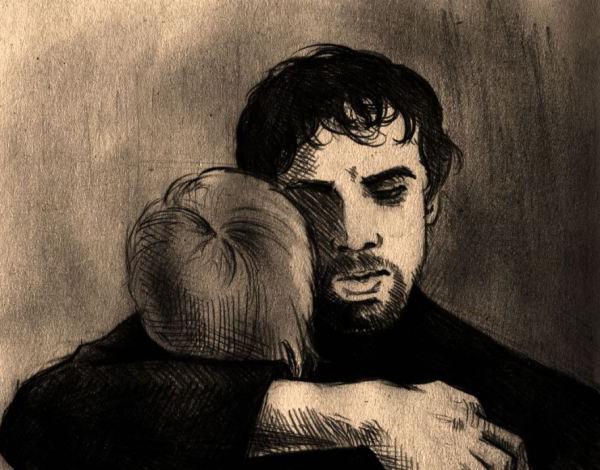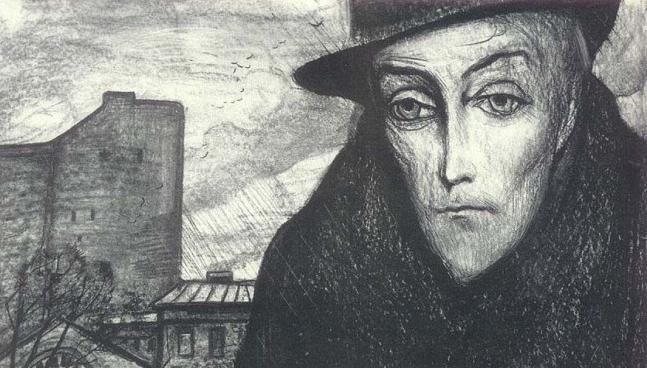There is an opinion that an absolutely positive character is not interesting. Is it so? Yes and no. Indeed, the “Hero” with a capital letter is often somewhat artificial. His thoughts and actions, like the whole spectrum of white shades - from snowy white to cream, are completely pure and free from resentment, envy and revenge. Not a single black spot: is this possible? And on the other hand - the image of Prince Myshkin in the novel by F. M. Dostoevsky "Idiot". It is impossible, or rather impossible, to recognize him - “positively beautiful”, “Prince Christ”, as the author himself called him - uninteresting or even fake and false. On the contrary, an amazing metamorphosis: the prince is not an imaginary hero, not a literary character, but already a living person with a unique tragic fate, too ideal for the world of unbridled passions and selfishness.
Main characters
The protagonist of the novel “The Idiot”, Prince Myshkin (the characterization of the image goes down further), is rightfully considered one of the most significant images both in the work of F. M. Dostoevsky and in world literature as a whole. The presence of Christ is constantly felt in him. Deprived of all egoism, pride, endowed with an amazing ability to penetrate into the very depths of nature and the soul of a person, the prince is, rather, not the ideal to be striven for, but a prism, through which the shaky material world and people with all their merits and shortcomings, and all those concepts and conventions with which we are accustomed to be guided in life appear in a different light.
Another main character of the novel is no exception - Nastasya Filippovna Barashkova. How did Prince Myshkin learn about Nastasya Filippovna? More on that later ... He saw her for the first time on a photographic card. Then a woman of extraordinary beauty appeared to the prince’s eyes: her eyes were dark, bottomless, her forehead was pensive, her face had passion and at the same time some kind of arrogance. Did she like him? Undoubtedly! But this amazing face, again passing through the transparent prism of his soul, is refracted in the most unexpected way. “The fate of this woman,” he says, “is not ordinary, because she suffered a lot of suffering; her face is cheerful, but proud is terrible.” And as if anticipating a disaster, he adds: "Is she good? After all, if good, everything would be saved!"
How did Prince Myshkin learn about Nastasya Filippovna
End of November. Thaw. The Petersburg-Warsaw train approached the northern capital, St. Petersburg, in full steam. In a third-class carriage, two passengers were facing each other. The surprising resemblance of random fellow travelers is noteworthy: both people are young, twenty-six to twenty-eight years old, no more, both light-weighted, not dressed in fashion and both with "pretty remarkable faces."
However, the hitherto invisible contrast between them is also exposed here. The first was warmly dressed, almost black-haired, with small but fiery eyes and an arrogant, smug look. The second "was forced to endure on his trembling back all the dampness of the November Russian night." He was blond, his eyes were huge, blue, steady and quiet. The names have not yet been spoken aloud, and suddenly the polarity between the two characters is revealed is compressed to the definitions “black-haired” and “blond”, which strengthens and anticipates their further relations “brotherhood-hostility”.
A fateful community-contrast could not pass by, and after a long silence both passengers wished to enter into a conversation during which their names - Parfyon Rogozhin and Prince Myshkin, as well as the name of a woman - Princess Barashkova, called to play the role of a kind of catalyst, an accelerator of a tragic denouement . And now in detail how Prince Myshkin learned about Nastasya Filippovna.
History of Parfyon Rogozhin
It turns out that five weeks ago, Rogozhin, like the prince himself now, with only one bundle from his father in Pskov to his aunt, escaped. There he immediately fell down in a fever, and his parent, meanwhile, died. If he didn’t start then, he would now be in the place of the deceased. How did he anger him like that?
Everything happened through one noble lady, a kind of princess - Nastasya Filippovna ... Once, running through Nevsky Prospekt, he saw her, Nastasya Filippovna, coming out of the store, slowly, proudly, and getting into the carriage. At that very moment he “burned” him. He fraudulently took ten thousand from his father, went nowhere without looking straight into the English store, and took everything and took a pair of diamond pendants. What then was under his feet, what was in front of him, what was on the sides - he saw nothing and did not remember. After they went with a friend, Zalezhev, right to her and, without introducing themselves, handed the box, asked to be deigned to receive from Mr. Rogozhin. She opened, looked up, grinned and accepted the gift. Further, there is more fog, because the deceased, Simon Parfenych, not only ten thousand, but ten ten rubles from the light, will not regret his own son. What to do? Here, either go drown, or give the ger. I decided the last - I took twenty rubles, and fled to Pskov, and there - on taverns, but wallowing in insensibility ... That's how Prince Myshkin found out about Nastasya Filippovna.

What abilities did Prince Myshkin possess
Already in the first chapters, the character traits of the main characters are revealed, and the main plan of the author is summarized: Prince Myshkin and Parfen Rogozhin - the personification of two opposite sides of one feeling - love. The first is Christian love, first of all, spiritual, all-pervading, all-forgiving, without expectation of reciprocity. The second is unbridled passion, all-pervasive, but not forgiving.
Gospel motifs
The image of the prince - “the prince Christ”, also comes from here. What abilities did Prince Myshkin possess? It embodied the idea of F.M. Dostoevsky about an ideal person who is able in the material world to move away his personal "I" and love his neighbor by the commandment of Christ as himself, to give his "I" to others without a trace with pure thoughts only for their salvation. However, such an ideal is possible only as a gift of God and cannot be acquired conscious ability. Yes, Christ is inherent in every person from birth, but he is not comprehensive. He manifests himself due to various circumstances, but together with him he lives differently, opposing the commandments of God with all his strength. This is confirmed by scenes when Prince Myshkin enters into conversations with various characters.

The first thing he always provoked was pity and alertness. "Idiot!" They said. But the prince was not a holy fool in the direct sense of the word. Yes, he saw and understood everything, but there was no humiliation or resentment in him. Yes, man is great, but he does not have power over his essence, over his destiny, over all that is complex and contradictory that God implies in him. And Christ and the Antichrist are inherent in it. The latter is a truly dark, impudent, cynical and at the same time eternal power, which acts outrageously, exposes itself, and revels in its sinfulness: "Look at all that I am!" Christ is silent, does not argue, does not shout, and does not prove his superiority. He waits for the demons to sack enough. “Are you what you now imagined. Could it be! ” - exclaims Prince Nastasya Filippovna. And she really is not what she is - vengeful, cruel and dissolute, however, like all others. And here an amazing thing happens: faith, true faith in a person, in his divine principle, faith without a shadow of pride and condemnation, with one glance, in a word stops all atrocities, and the dark turns to light. Forever? No, just for a moment. But Lord, what a moment!
The prince was neither a holy fool nor a "idiot" malachol. He “understood inside the born and yet secret Word, which is hidden in the soul” and “very soon and trustingly inspired” and spoke sincerely, generously, selflessly and passionately. And they also soon and sincerely reached out to him, in a minute or two they loved, they certainly wanted to talk with him, had already hoped for him, already trusted him with secrets, kissed his hand and confessed. The proud girls Epanchiny, the general, the rogue Lebedev, Hippolytus, the vile fraudster Doctorenko, the involuntary impostor Burdovsky, who lost “any sign of morality” Keller, etc. - every single one thanks to the prince and only in his presence they discover Christ in themselves. But, unfortunately, “they are all pre-comic people,” because outside the gospel, without a prince, they again found themselves the same: pride, fear, ambition, prejudice and greed still prevailed over them.
Reverse effect
It is impossible to deny the inverse effect of the "secular world" on the life of the prince. Yes, he wants to be - and no doubt is! - that pivot, equilibrium, capable of revealing, organizing, reconciling and ennobled, but at the same time a rich, eventful life captures him. He longs for her and for some time, even if very briefly, becomes her active participant. So, the touching, warm and full of lyricism relations between the prince and Aglaya grow into something more - “little by little, he became terribly happy”, leaving behind his old fears and doubts, and for a moment it seems - here it is a long-awaited salvation! But the engagement was not destined to happen ...
And the matter is not in the prince’s epileptic illness, not in Nastasya Filippovna, not in Rogozhin and not in his immense desire to save everyone and everything, or rather, in them, but they are only the tip of the iceberg. Under the dark thickness of the water lies something else - the impossibility of betraying one's essence, and therefore changing one's fate. Just as Prince Lev Nikolaevich could not (on the question of the name of Prince Myshkin) change the world around him, so the world could not change it. Did the prince realize this? Yes. Finding himself at the very center of intricate intricacies and fatal passions, he realizes that the death of all those with whom fate has linked him and is inevitable. All that he can do is to bow down to their sufferings, reconcile himself to fate - God's plan, as truly correct, and selflessly share their fate with them - perhaps this will at least ease the torment. Intolerable ordeals, mental anguish and death, on the one hand, create a condensed atmosphere of hopelessness, and on the other hand, are necessary, because only they lead to the knowledge of God, the Resurrection and immortality. And here it feels like indescribable joy, tenderness and inspiration - here it is an incomprehensible truth! - so deep and, one might say, sublime flour. Antichrist fights with God, and the eternal battlefield - the souls of people ...